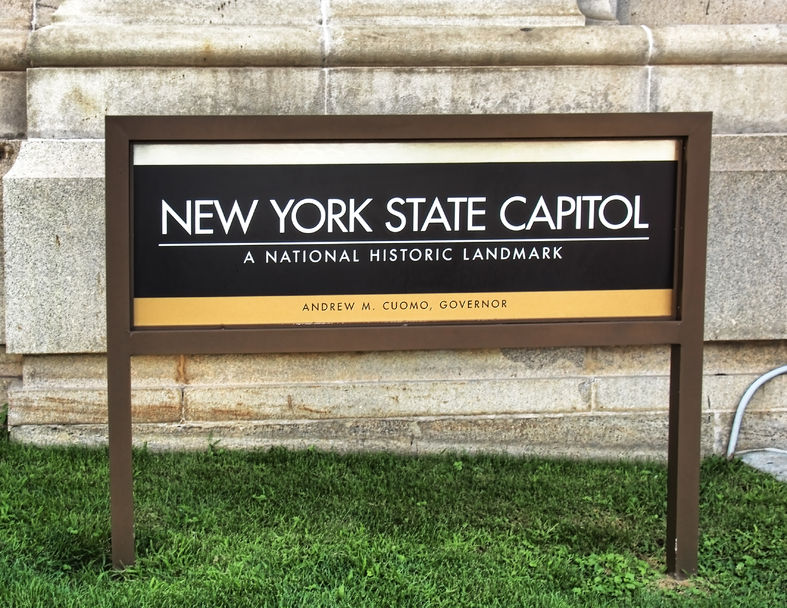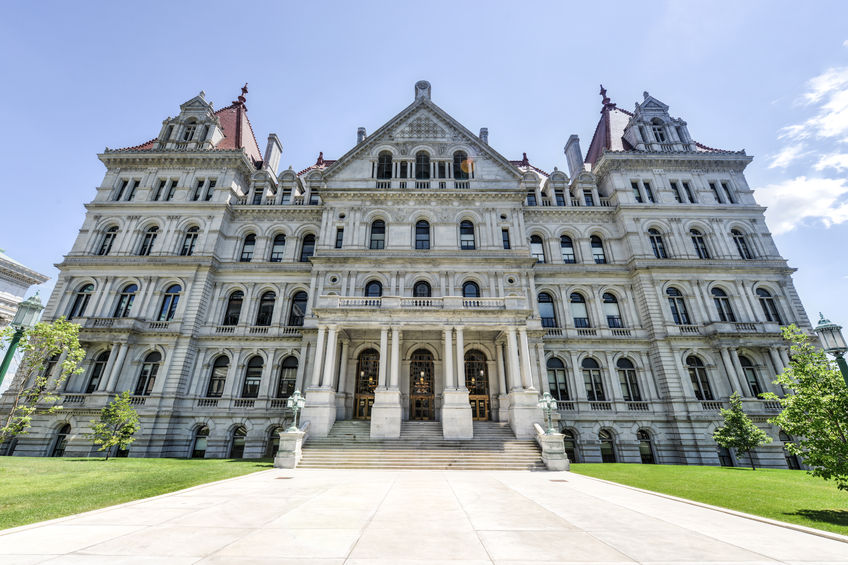
“A Bad Solution in Search of a Problem”: SBFA’s Response to the New York Disclosure Bill
August 6, 2020 “It’s actually shocking to me how tone deaf those who claim to represent our industry are when it comes to policy,” is how Steve Denis, Executive Director of the Small Business Finance Association, described the Innovative Lending Platform Association’s response to and influence over the drafting of bill A10118A/S5470B. Known as New York’s APR disclosure bill, S5470B has been passed by the state legislature, and if signed by Governor Cuomo, will require small business financing contracts to disclose the annual percentage rate as well as other uniform disclosures.
“It’s actually shocking to me how tone deaf those who claim to represent our industry are when it comes to policy,” is how Steve Denis, Executive Director of the Small Business Finance Association, described the Innovative Lending Platform Association’s response to and influence over the drafting of bill A10118A/S5470B. Known as New York’s APR disclosure bill, S5470B has been passed by the state legislature, and if signed by Governor Cuomo, will require small business financing contracts to disclose the annual percentage rate as well as other uniform disclosures.
Speaking to deBanked over the phone, Denis expressed disappointment with both the bill as well as comments made by ILPA’s CEO, Scott Stewart, in a recent article.
“Small businesses in New York are struggling right now,” the Director noted. “They’re waking up every single day wondering if they should even stay open or close permanently, and companies and organizations in our space are using their resources to push a disclosure bill that nobody has asked for. There’s no widespread issue with disclosure. There’s been no outpouring of complaints to regulators. No bad reviews on Trustpilot. This is a really bad solution in search of a problem. We have real problems right now, we should be coming together as an industry to help solve them. We want to make sure that capital is available to small businesses on the other side of this pandemic, and this group of tone deaf companies are spending resources trying to push a meaningless disclosure bill that’s just going to hurt the access to capital for real small businesses who are grinding and trying to figure out how to stay open. It’s unbelievable.”
The SBFA showed deBanked a list of issues and complaints made to the New York legislature regarding S5470B. According to the trade group, these were largely ignored and the bill was pushed through with the issues left in. Among these were problems relating to definitions and terms. No definition for the application process is included, nor is there one for a finance charge. As well as this, one senator was quoted using the term “double dipping” to refer to consumers refinancing debts that have prepayment penalties; which Denis said was “creating a whole new term that’s never been used or defined before, and applying it to commercial finance, something that’s never been done.”
Accompanying these complaints was one regarding how APR is calculated, as S5470B includes two different calculations for this, producing different results while not clearly defining when to use each.
 When asked why he believes these issues were allowed to remain in the language of the bill, Denis was baffled.
When asked why he believes these issues were allowed to remain in the language of the bill, Denis was baffled.
“I think that the companies and organizations that support this legislation don’t fully understand what’s actually in the bill. […] They have no problem pounding the table and taking credit for its passage, but I guess they don’t realize it will subject them and the rest of the alternative finance industry to massive liability, massive fines—upwards of billions of dollars worth of fines.”
Denis’s fear going forward is that funders in New York will tighten up their channels going forward or cease funding entirely, given the increased riskiness of funding under the terms of S5470B if Cuomo signs it into law. Before that happens though, the Director mentioned that he believes there will be legal challenges to the bill in the future, saying that its wording is just too unclear and poorly drafted. Adding to this, Denis said that he believes many members of New York’s state government are aware that this bill is imperfect and were comfortable with the thought of it being edited once passed. Looking forward, Denis wants the SBFA to be deeply involved in those edits, saying that they’re willing to work with the Governor, the state assembly, and the New York Department of Financial Services.
“We’re for disclosure, we think there should be standard disclosure. … Our message to the Governor’s office is ‘Let’s take a step back.’ The Department of Financial Services needs to look at our industry, they need to get to know our industry. They are the experts that understand the space, they understand disclosure, and they understand what they need to do to bring responsible lending to New Yorkers. And we would like to work with the NYDFS and a broader industry to put forward a bill that’s led by the Governor and the Governor’s office that brings meaningful disclosure and meaningful safeguards to this industry.”
“Our Model Disclosure Legislation”: ILPA’s CEO on New York’s APR disclosure bill
July 28, 2020 Late last week the New York State legislature voted to pass A10118A/S5470B, a bill that might lead to greater clarity and consumer knowledge according to Scott Stewart, CEO of the Innovative Lending Platform Association, a trade association of small business lenders.
Late last week the New York State legislature voted to pass A10118A/S5470B, a bill that might lead to greater clarity and consumer knowledge according to Scott Stewart, CEO of the Innovative Lending Platform Association, a trade association of small business lenders.
Referring to it as “our model disclosure legislation,” Stewart explained in a phone call the work that the ILPA put in to help the bill through as well as what sort of impacts can be expected from S5470B.
“The implications are that small businesses, certainly in New York to begin with, but we think throughout the country, will have the opportunity to really see, understand, and compare various different sources and products for financing their small businesses in terms of their expansion and success. That’s something we’re very proud of and I think that’s something the small business borrower really deserves to see. They deserve to see and understand exactly what they’re doing and when they’re taking out financing products for their businesses.”
What exactly these business owners will understand better relates to the details of the bill, which requires small business financing contracts to disclose the annual percentage rate as well as other uniform disclosures. If signed by New York Governor Cuomo, the bill could have ramifications on small business lenders, MCA, and factoring providers.

ILPA, founded in 2016 and comprised by the likes of Kabbage, OnDeck, and BlueVine; worked alongside legislators to help with the drafting of the bill, assisting with the wording so that it reflects their own SMART Box initiative. This being a form offered by ILPA which lists a number of metrics worth considering when seeking small business financing.
“In January 2019, our team came together and decided that it made sense in the wake of 1235 in California to take a proactive approach to codify SMART Box as legislation in a state, and we selected New York because we felt we had a favorable legislature there,” Stewart said. “I think it’s an incredible achievement. You see the big margins that it passed by in both the Assembly and the Senate and we’re very, very proud of that. I think it really speaks to our cooperative approach to building legislation. And now, as we move toward the implementation phase, we’re going to be in a place where, hopefully in the next six months or so, small businesses will begin receiving really clear disclosures on the capital and credit that they’re trying to take out.”
As noted though, the bill must be signed by Governor Cuomo before becoming law, and then it will affect New York only. Beyond the Empire State though, Stewart is hopeful that ILPA will be able to implement the terms of S5470B in other states.
“Now that we have hopefully harmonized the legislative landscape between California, with 1235, and New York; hopefully we’ll be able to export that to other states. We don’t have any accurate plans at this time to do that, but we feel like if two of the larger states in the nation have very similar disclosure regimes then we’re on the track toward seeing this nationwide.”
New York State Legislature Passes Law That Requires APR Disclosure On Small Business Finance Contracts (Even If They’re Not Loans)
July 24, 2020 Factoring companies and merchant cash advance providers may be in for a rude awakening in New York. The legislature there, in a matter of days, has rammed through a new law that requires APRs and other uniform disclosures be presented on commercial finance contracts… even if the agreements are not loans and even if one cannot be mathematically ascertained.
Factoring companies and merchant cash advance providers may be in for a rude awakening in New York. The legislature there, in a matter of days, has rammed through a new law that requires APRs and other uniform disclosures be presented on commercial finance contracts… even if the agreements are not loans and even if one cannot be mathematically ascertained.
The law also makes New York’s Department of Financial Services (DFS) the overseer and regulatory authority of all such finance agreements. DFS can impose penalties for violations of the law, the language says.
The bill was passed through so quickly that unusual jargon remained in the final version, increasing the likelihood that there will be confusion during the roll-out. One such issue raised is the requirement that a capital provider disclose whether or not there is any “double dipping” going on in the transaction. The term led to a rather interesting debate on the Senate Floor where Senator George Borrello expounded that double dipping might be well understood at a party where potato chips are available but that it did not formally exist in finance and made little sense to have it written into law.
Senator Kevin Thomas, the senate sponsor of the bill, admitted that there was opposition to the “technicalities” of it by some industry groups like the Small Business Finance Association and that PayPal was one such particular company that had opposed it on that basis. Senator Borrello raised the concern that a similar law had already been passed in California and that even with all of their best minds, the state regulatory authorities had been unable to come up with a mutually agreed upon way to calculate APR for products in which there is no absolute time-frame. Thomas, acknowledging that, hoped that DFS would be able to come up with their own math.
APR as defined under Federal “Regulation Z”, which the New York law points to for its definition, does not permit any room for imprecision. The issue calls to mind a consent order that an online consumer lender (LendUp) entered into with the Consumer Financial Protection Bureau in 2016 after the agency accused the lender of understating its APR by only 1/10th of 1%. The penalty to LendUp was $1.8 million.
Providers of small business loans, MCAs, factoring and other types of commercial financing in New York would probably be well advised to consult an attorney for a legal analysis and plan of action for compliance with this law. The governor still needs to sign the bill and New York’s DFS still has to prepare for its new oversight role.
Passage of the law was celebrated by Funding Circle on social media and retweeted by Assemblyman Ken Zebrowski who sponsored the bill. The Responsible Business Lending Coalition simultaneously published a statement.
New York State Legislators Resume Push of Commercial Finance Disclosure Bill
July 17, 2020 A bill (A10118A / S5470B) intended to create uniform disclosures for comparison purposes while also placing control of the commercial finance industry under the purview of the superintendent of the New York Department of Financial Services, is moving forward.
A bill (A10118A / S5470B) intended to create uniform disclosures for comparison purposes while also placing control of the commercial finance industry under the purview of the superintendent of the New York Department of Financial Services, is moving forward.
The March 2020 initiative was picked back up this week by members of the Assembly where it passed the banking committee and codes committee on a unanimous and bipartisan basis.
“When enacted, this bill will become the strongest commercial lending disclosure law in the country that covers all commercial financing products,” wrote Ryan Metcalf, Head of US Regulatory Affairs and Social Impact at Funding Circle, on LinkedIn. “It includes strong provisions that ensures enforcement and eliminates loopholes that will prevent gaming & abuse, & requires APR to be disclosed for all products.”
Metcalf further wrote that they and the Responsible Business Lending Coalition (RBLC) have been working diligently with NY state legislators for the last year or so to craft this bill. Among RBLC’s membership is Fundera, Nav, Lendistry, LendingClub and about 4 dozen other companies.
With New York in a State of Emergency, Its Legislators Rush to Regulate Disclosures in the Commercial Finance Industry
March 16, 2020 On March 7th, Governor Cuomo declared a disaster emergency for New York State. Four and 6 days later respectively, legislators in the state Assembly and Senate introduced commercial financing disclosure bills that would regulate all business-to-business financing transactions including secured loans, factoring, and merchant cash advances. The bills intend to create uniform disclosures for comparison purposes while also placing control of the commercial finance industry under the purview of the superintendent of the New York Department of Financial Services (DFS).
On March 7th, Governor Cuomo declared a disaster emergency for New York State. Four and 6 days later respectively, legislators in the state Assembly and Senate introduced commercial financing disclosure bills that would regulate all business-to-business financing transactions including secured loans, factoring, and merchant cash advances. The bills intend to create uniform disclosures for comparison purposes while also placing control of the commercial finance industry under the purview of the superintendent of the New York Department of Financial Services (DFS).
The bills also state that merchant cash advance companies may be required to prepare funding reports on all of their deals for the DFS to inspect so that the superintendent can analyze the difference between the estimated anticipated APR and the actual retrospective APR that resulted after the merchants delivered all of the receivables to the funder on each deal.
The bills are said to have been in the works for some time, but the timing of their introduction is awkward given the sudden economic situation that is unfolding in the state.
The bills are actually quite lengthy so you can read them yourselves in full here:
Assembly Bill A10118 – Introduced by Kenneth Zebrowski
Senate Bill S05470A – Introduced by Kevin Thomas





























